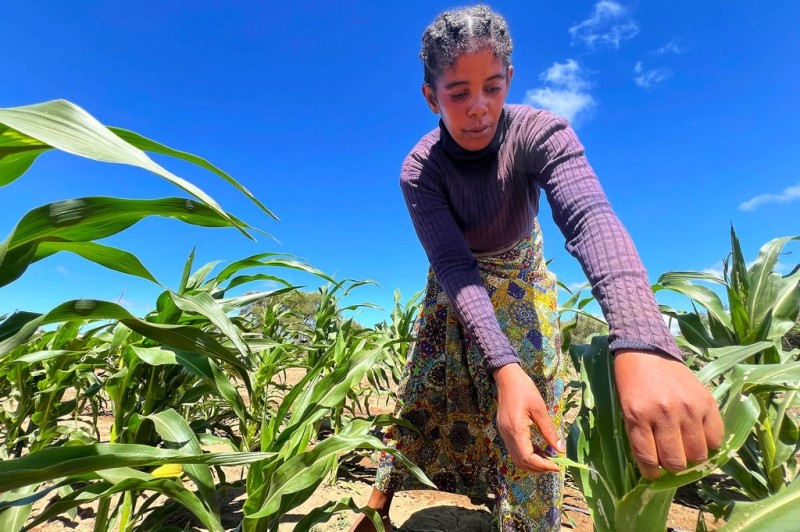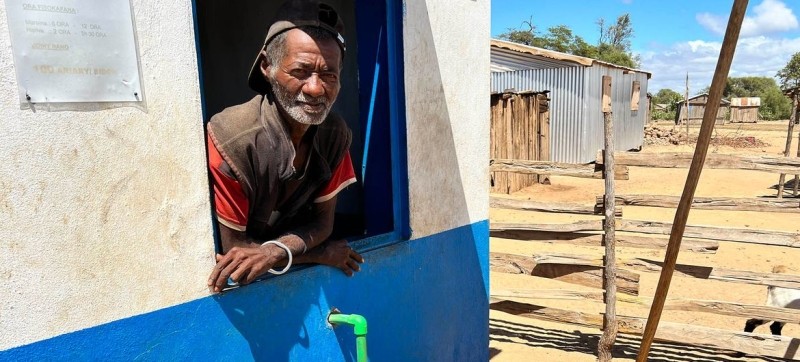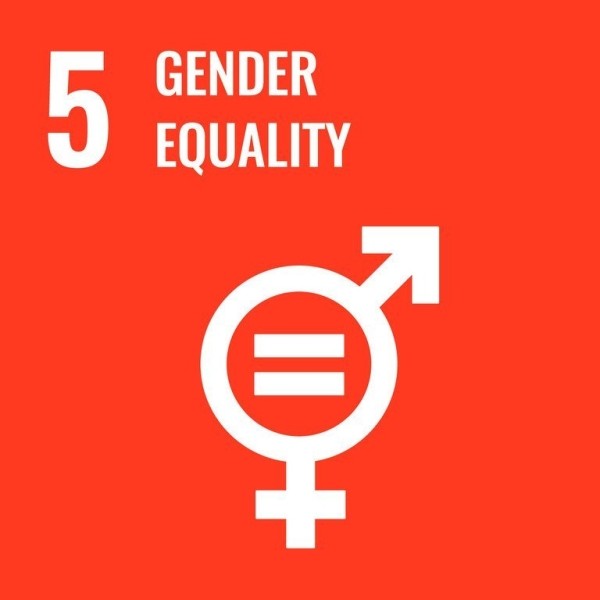UN News/Daniel Dickinson Women farmers in southern Madagascar work their irrigated field of maize.
They live in the village of Ankilinanjosoa in Anosy, a region which has suffered a series of droughts leading to the failures of multiple harvests.
Twenty-five women formed a grower’s association which has access to water as part of a project supported by the UN Children’s Fund (UNICEF).

UN News/Daniel Dickinson Tenefo Votsirasoa is a member of a women's growers association in the village of Ankilinanjosoa.
It’s hoped a reliable way to irrigate their crops will not only help to build their resilience to the drought conditions but also allow them to make their own decisions about how to spend their money.
Ahead of World Water Day, marked annually on 22 March, farmer Tenefo Votsirasoa explains that access to water is everything.
“In this garden of around 500m2, we are growing maize, courgettes, greens, tomatoes, peppers, onions and sometimes beans. Maize especially needs a lot of water.
We get water from the village supply. It costs 100 ariary (2 US cents) for a 20-litre jerry can. We spend about 2,000 ariary (44 US cents) a day on water.
Before, if we wanted to cultivate crops we had to buy water which was collected from the river, which cost 500 to 1,000 ariary (11-22 US cents) per jerry can, so it was very expensive to grow any food.
We have a system of irrigation provided by UNICEF, which means our crops always get enough water. We do have to rent the pump to irrigate the field, but we hope one day as an association we will be able to buy our own pump, which will ultimately save us money.

UN News/Daniel Dickinson Water is on tap for the first time in Ankilinanjosoa village.
Supporting the family
I have eight children, five girls and three boys, and now that I have access to family planning information, I will not have any more.
The girls come to help in the field after school. It is not our culture for boys to come. They stay home to study or do other work, for example, looking after cattle. My husband left home to find work and is living a long way away towards the north of the country.
Now I can provide enough food to feed my family and can sell the rest so I can afford to send the children to school and to pay for medical care. I am also saving some money.

United Nations SDG 5
SDG 5: EMPOWER ALL WOMEN AND GIRLS
- End all forms of discrimination and violence against women and girls
- Eliminate such harmful practices as early and forced marriages and female genital mutilation
- Adapt and strengthen legislation to promote gender equality and empower women and girls
- Ensure women’s full and effective participation and equal opportunities for leadership in political, economic and public life
- Ensure universal access to sexual and reproductive health care
Globally, almost half of all married women currently lack decision-making power over their sexual and reproductive health and rights.
Village associations
The village has a population of about 1,200. Our association of farmers is made up of some of the women who have the fewest opportunities. We do not produce enough to feed everyone in the village, but many have the resources to buy food for themselves in the market.
The biggest change in my life is the independence that farming had given me. I don’t have to ask men for money as I have my own, and I don’t have to do what a man tells me to do, so I feel more equal. I think in the eyes of men, our independence is respected, and we have some worth as people.
I’m not interested in being more powerful than men; they also have an association in the village, so we can work alongside each other in our separate associations.
We have had four harvests so far, and I am very happy with our progress. It is a good idea to be in an association.
My tip for a good crop to grow is beans. If you plant 10 bags of seeds, you can harvest 100 bags of beans.”
UN in Madagascar
UN agencies work together across countries, including Madagascar. Here are some examples of what they do in the village of Ankilinanjosoa:
- The UN Children’s Fund (UNICEF) supported the building of a well and 10m3 tank to collect and store fresh water as well as irrigation systems. Two kiosks selling water were opened, and water troughs were provided for farm animals.
- The Food and Agriculture Organization (FAO) has provided farmer training.
- The UN Population Fund (UNFPA) and the World Health Organization (WHO) support a mobile clinic service which visits regularly offering a range of services

